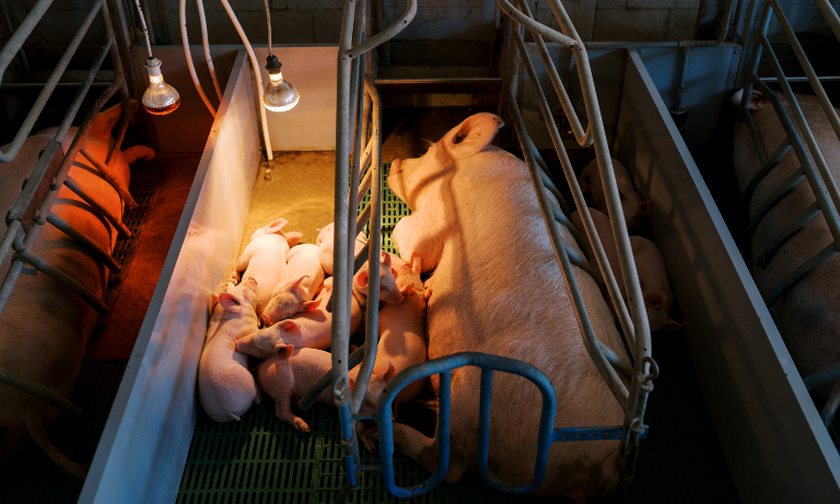British Vet Association calls for ban on controversial farrowing crates

The British Veterinary Association (BVA) has called for a ban on the use of farrowing crates, which confine female pigs before and after giving birth.
The crates, widely used in commercial farming, restrict the movement of sows in order to prevent piglets from being accidentally crushed.
However, the BVA, along with the Pig Veterinary Society (PVS), argue that the practice negatively impacts the welfare of the sows and limits their ability to engage in natural behaviours.
The call comes after new statistics from the BVA’s Voice of the Veterinary Profession survey revealed that nearly 75% of vets are concerned about the welfare impacts of farrowing crates.
Farrowing crates, introduced in the 1960s, are designed to limit the sow’s movement and prevent crushing incidents.
Around 60% of UK sows are kept in these crates from a week before birth until piglets are weaned at around four weeks old.
Despite their intended purpose, farrowing crates are increasingly criticised: 20% of vets are concerned that they prevent sows from performing basic behaviours, such as turning around or moving freely.
Additionally, 9% of veterinarians have concerns that the welfare of the sows is being sacrificed in favour of piglet health.
In response, the BVA and PVS are calling for a ban on farrowing crates in their current form, with the aim of replacing them with systems that prioritise both sow and piglet welfare while ensuring human safety.
They propose a 15-year transition period to implement these changes, during which no new farrowing crates should be introduced unless they are adapted to meet higher welfare standards.
Additionally, the BVA and PVS recommend that the UK government provide adequate funding to support this transition, ensuring that UK producers are not disadvantaged.
They also suggest launching an awareness campaign to inform consumers about the upcoming changes and the transition to more humane farrowing systems.
Finally, they emphasise the importance of support for farmers during the transition period to ensure that they can confidently implement best practices for animal welfare in the new farrowing accommodations.
Dr Elizabeth Mullineaux, president of the BVA, said: "It’s time for change, and we’re recommending a transition period of up to fifteen years, backed by sufficient resources, to support producers.
“Whilst farrowing crates protect some aspects of the welfare of piglets, this controversial safeguarding method comes at the expense of the sows who are forced to live with restrictions on their natural behaviours and movements for extended periods of time."
Prof Dan Tucker, president of PVS, echoed the need for balanced reform: “There is now sufficient research-based evidence to support systems that optimise the balance between the sows’ needs, piglet health and welfare, and stock keeper safety.”
He added that a phased transition would prevent economic shocks and help maintain the UK’s high welfare standards.








